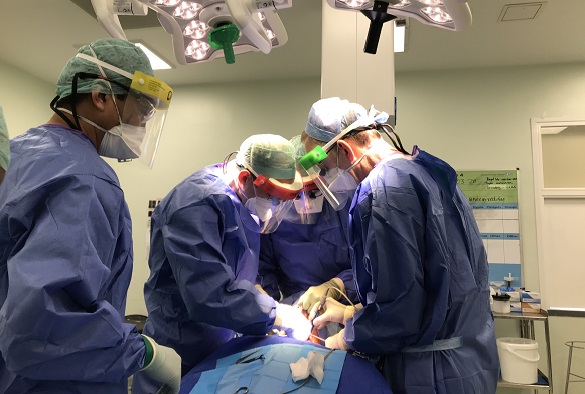
H&N surgery being undertaken by a surgical team in full Personal Protective Equipment (PPE)
Researchers from the Liverpool Head and Neck Centre (LHNC), have joined an international research collaboration, COVIDSurg-Cancer project, to establish whether operating on Head and Neck cancers is safe for both patients and clinical staff in the COVID-19 era.
COVID-19 is a rapidly expanding global challenge, placing a huge burden on healthcare systems. Currently, there is no evidence to inform the management of surgical patients with COVID-19 infection.
The NHS is clear that healthcare professionals must ensure that cancer diagnosis, treatment and care continues during the response to the COVID-19 emergency. Sharing international experience is vital to inform the management of this complex group of patients, improving their clinical care.
Three months
The term ‘Head and Neck Cancer’ describes a host of cancers, which may occur in many areas of the head and neck, outside the brain. The most common cancers arise from the lining of the mouth, voice box and throat, although head and neck cancer may also arise from other organs in the head and neck such as the thyroid gland or salivary glands.
Head & Neck (H&N) cancer tumours become inoperable after three months. As such, the risks of not operating on patients during this time is high but equally, the risks of operating are also high for the surgical teams. One H&N surgeon in UK has already died as a result of COVID-19 and another has been ventilated as a result of occupational exposure.
The LHNC is a collaboration of the following partners: University of Liverpool, Liverpool Health Partners, Mersey Head and Neck Oncology Research Group and NHS Foundation Trusts. The Centre draws together world class research and medical expertise to provide the best possible results for Head and Neck cancer patients locally.
COVIDSurg-Cancer project
Professor Richard Shaw and Reader Andrew Schache have collaborated with the NIHR Global Surgery Unit in Birmingham to create a head and neck cancer study, forming part of the wider COVIDSurg-Cancer project, to measure the safety of H&N surgery and implications of changes to practice.
COVIDSurg is a collaboration of more than 2800 surgeons and anaesthetists from 115 countries delivering a set of studies to collect international data and efficiently inform clinical practice.
Achieving the best outcomes
Professor Richard Shaw, said: “The Covid-19 pandemic represents a challenge in so many ways. In healthcare, we are now beginning to understand the size of the task, not least because ensuring adequate care of serious cases will displace our efforts away from other lethal diseases such as cancer.
“Head and Neck cancer is a devastating disease and is a major healthcare problem in urban areas of Cheshire and Merseyside, in particular, Liverpool. The area has three times* the national average of cases which compares with socio-economically deprived regions of India, South America and South Africa.
“The issues in head and neck cancer are particularly concerning. This is because some of the cases who might normally have excellent prognosis cannot be adequately tackled without surgery, and the can advance quite rapidly compared with other cancers. Also it is already known that surgery to the upper airway is known to be very high risk to surgeons and theatre staff if, inadvertently ,COVID-19 positive patients were subject to surgery.
“Our new study aims to provide the data that can help us to answer questions such as; ‘Is it safe to operate on cancer in this environment for either patient or doctor?’ and, ‘How long is it reasonable to delay surgery whilst we wait for the ‘storm to pass’?’
“It is hoped that within a few weeks, a measure of the safety of such surgery and implications of changes to practice will be known. This will inform the decision-making later into the pandemic and achieve the best outcomes for our patients and staff.”